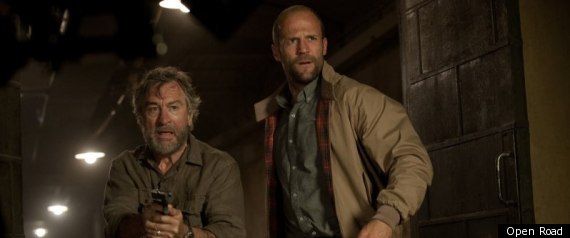 When legendary British adventurer Sir Ranulph Fiennes released his book, "The Feather Men," in 1991, his accusations of military secrecy, revenge and assassination caused a ruckus in Great Britain. With the release this weekend of "The Killer Elite," the action film based on that book, the controversy is being stirred up once again.
When legendary British adventurer Sir Ranulph Fiennes released his book, "The Feather Men," in 1991, his accusations of military secrecy, revenge and assassination caused a ruckus in Great Britain. With the release this weekend of "The Killer Elite," the action film based on that book, the controversy is being stirred up once again.
The film adaptation, out Friday, condenses the action to a short timeline and casts action vet Jason Statham in the role of the assassin. Trying to stop him is Clive Owen, who plays a former SAS member now working for the secretive Feather Men, a group that seeks to protect past agents from payback plots caused by their clandestine actions.
The Huffington Post spoke with director Gary McKendry about the film and his approach to the controversy.
How much did you take from the novel and how much did you change for the script?
The key to the novel that I liked was that the main two protagonists, the hunter and the hunted -- or the hunter and the guy that was becoming the hunter -- ended up being the same person. There was no clear bad guy. And I know that's going to drive some viewers fucking crazy. They're going to hate it because it's not a usual element in an action movie, but at the same time, that's the thing that drew me to it. Even though that was set in 1980, I think sitting here today, it's really relevant, because I don't think people really believe we live in a black and white world anymore.
As you were making the movie, did you experience a lot of pushback from officials and people who were trying to deny things?
A lot. It became quite hard to get advisers from the SAS. We would get advisers from the SAS and I think they would get leaned on and suddenly they would vanish, or people would give us insights on what really happened and suddenly they'd ring back and say, "Sorry, I don't want to talk about this anymore." Because I think some of the families involved in the story have an ongoing dispute with Ranulph Fiennes ... And actually I think it's funny, because I was really sort of, I was getting upset in some of the directions that people wanted to take the script in -- away from the book -- because I thought it was doing the soldiers a disservice.
What did they want to do?
It would be a lot easier for Jason's lead role -- for what Jason's journey is -- if he's killing guys who have it coming. These guys don't deserve it. From our perspective, they don't deserve it, but from Arab perspective, they do. It depends on what viewpoint you go by. From the law of a soldier fighting a war, okay, well, they did okay, but from the law of an Arab whose country they came in and fought an undeclared war, well, they're murderers.
Were you trying to say anything about the wars we fight today, or are you just trying to tell a story?
It never changes. It's the same. The years change but the wars are just the same stuff. You look at what's going on in England at the moment; you could change Oman to Libya. The Lockerbie bomber is released; two days later BP gets a giant oil contract. The guy who is gonna die goes home, he's alive two years later, and as soon as there's democracy in Libya, the first people who are in are the MI6 and SAS, cleaning up the evidence. Our movie is set in 1980, but really, it's 2011 and it could be the same thing.
It's rare to have people go against the military in a movie here. Were you worried about that?
Not really, because ... I think they were all being used. To be honest with you, if my daughter had died in Iraq, or my daughter had died in Afghanistan, at the moment, I'd be pretty fucking pissed off and disappointed.
I think, on the whole, soldiers are used pretty badly. Everyone cares about them when they're in uniform, but nobody cares when they're out of uniform. Nobody cares when they're fucked up and living under a bridge or having trouble with deep debt. So this for me, the story that attracted me with this, is the after.
I wasn't going against the British army -- I love the SAS. I grew up in Belfast, they saved my ass from the IRA. Which is why I wouldn't vilify them.
"The Killer Elite" hits theaters on Friday.
No comments:
Post a Comment